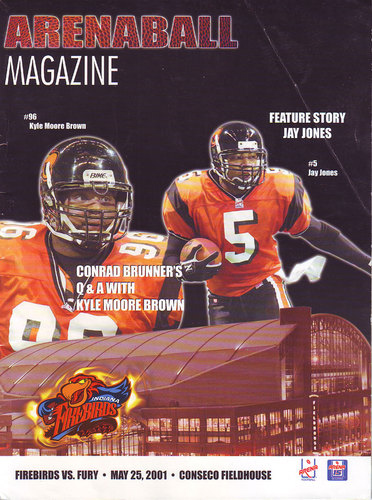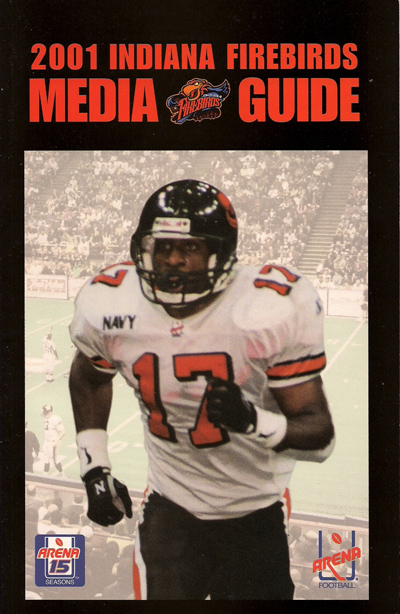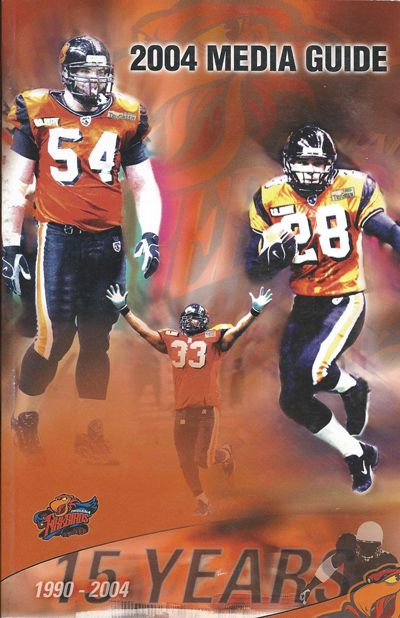Arena Football League (2001-2004)
Tombstone
Born: October 19, 2000 – The Albany Firebirds relocate to Indianapolis, IN
Folded: September 20, 2004
First Game: April 14, 2001 (L 60-59 vs. Grand Rapids Rampage)
Last Game: May 23, 2004 (L 53-37 @ Chicago Rush)
Arena Bowl Championships: None
Arena
Conseco Fieldhouse (15,490)12002 Arena Football League Record & Fact Book
Opened: 1999
Marketing
Team Colors: Orange, Black & White22002 Arena Football League Record & Fact Book
Radio:
- 2004: ESPN (950 AM)
Radio Broadcaster:
- 2004: Rob Blackman
Dance Team: The Flames
Mascot: Spike (the Bird)
Ownership
Owners:
- 2001-2002: Glenn Mazula, Dave Lageschulte, et al.
- 2002-2004: Dave Lageschulte
Trophy Case
Arena Football League Rookie of the Year
- 2004: Adrian McPherson
Background
Albany, New York was an ideal Arena Football town in the early years of the 50-yard indoor football hybrid. New York’s capital city had a brand new 14,000-seat downtown arena in early 1990’s and little going on in the way of summertime sports entertainment, especially after the local New York Yankees farm team left town in 1995. The Albany Firebirds (1990-2000) had a dedicated fan base and won the AFL’s Arena Bowl championship on their home floor in 1999.
But by the early 2000’s, Arena Football’s ambitions had outgrown smaller markets with loyal audiences in places like Albany, Des Moines and Grand Rapids. Several NFL owners began kicking the tires on expansion teams. When Firebirds owner Glenn Mazula bought into the struggling league in 1990, he paid a $125,000 expansion fee. In 1999, the year the Firebirds won their first and only Arena Bowl, a 24-year old movie studio scion named Casey Wasserman paid a $5 million expansion fee to put a team in L.A.’s STAPLES Center.
The following year saw the debut of Arena Football 2, a sprawling small market developmental league aimed at cities much like Albany. Perhaps not coincidentally, 2000 was the Firebirds final season in Albany. Glenn Mazula moved the team to Indianapolis in September 2000.
Touchdown Eddie Brown & Friends
The Firebirds arrived in Indianapolis in April 2001 with their old name and logo intact. They also brought with them perhaps the greatest player in Arena Football history, offensive specialist “Touchdown” Eddie Brown. Brown was the AFL’s Most Valuable Player during his 1994 rookie season in Albany and earned Offensive Player-of-the-Year honors in 1996 and 1999. At 31, he was still one of the league’s top offensive threats, hauling in 75 touchdown passes for Indiana from 2001 to 2003.
Quarterback Ray Philyaw threw most of those spirals, commanding the Indiana offense for the team’s first three seasons. Fullback-Linebacker Leroy Thompson, a holdover like Brown and Philyaw from the Albany years, handled what little running game there was in the AFL.
Final Season
The Firebirds had only one winning season in Indianapolis, going 9-5 in their 2001 debut. The team re-tooled extensively in 2004. Eddie Brown retired. Long-time NFL quarterback Steve DeBerg took over head coaching duties from Mike Dailey, architect of the Albany’s 1999 Arena Bowl championship team. Philyaw moved on as well, replaced at quarterback by enigmatic former Florida State star Adrian McPherson.
McPherson flashed electrifying skills as a sophomore at Florida State in 2002, but was kicked off the team late in the year amidst a swirl of gambling and check forging charges. McPherson hadn’t played organized football in over a year and missed the Firebirds’ mini-camp that might have helped him acclimate to the dynamics of the indoor game. Despite joining the team less a month before the 2004 season opener, McPherson won a three-man competition for the starting job.
The Firebirds got off to an 0-5 start that resulted in DeBerg’s firing in early March 2004. But the ‘Birds immediately rallied under replacement Mike Wilpolt, winning their next six in a row. Indiana finished the season 8-8 and missed the playoffs. Adrian McPherson caught fire, passing for 61 touchdowns and running for 19. He earned AFL Rookie-of-the-Year honors and parlayed his success into a 5th round draft selection by the NFL’s New Orleans Saints the following spring.
Extinguished
Off the field, all was not well. The Firebirds never benefitted from local ownership. New Yorker Glenn Mazula continued to own the team for its first two seasons in Indy. In August 2002, Mazula sold the team to Florida-based Dave Lageschulte, an early investor in the Hooters restaurant chain. Lageschulte previously owned another AFL franchise, the Miami Hooters, during the mid-1990’s.
By the summer of 2004 Lageschulte was actively seeking to unload the Firebirds, citing several million dollars in losses.3Rabjohns, Jeff. “Firebirds may have buyer”. The Star (Indianapolis, IN). September 22, 2004 That September, Lageschulte antagonized Arena Football League officials by placing the Firebirds franchise for sale on e-Bay. The stunt tended to undercut the league’s favored story line about skyrocketing franchise values and high profile investors. The Firebirds ended up folding later that month when no suitable buyers materialized.
Aftermath
The original Arena Football League folded in 2009 after the speculative bubble around its expansion fees deflated in the early stages of the Great Recession. A new, lower-budget re-boot of the AFL returned to the play in 2010.
In honor of the AFL’s 20th season in 2006, a committee of league officials, players & coaches voted on the Top 20 players in the league’s history. Touchdown Eddie Brown ranked #1 on the list.
Eddie Brown’s son, Antonio Brown, already a teenager during the Firebirds’ Indiana era, entered the NFL as a sixth round draft pick of the Pittsburgh Steelers in 2010. He earned four consecutive All-Pro selections from 2014 to 2017.
Voices
“Desperate men do desperate things.”
– Chris McCluskey, Arena Football League spokesman, commenting on Dave Lageschulte’s stunt of listing the Firebirds for sale on e-Bay in September 2004.4Rabjohns, Jeff. “Firebirds are there for the bidding”. The Star (Indianapolis, IN). September 11, 2004
In Memoriam
Former Firebirds owner David Lageschulte died on March 11, 2014 after a long battle with prostate cancer. He was 62.
Links
##




One Response
I was stunned when the Firebirds announced that they were not returning for the 2005 season. I covered the club during its last season in Indy and crowds were around 10,000 plus. However, this was at the same time the Colts began their push as Superbowl contenders and both fans and sponsors flocked to the NFL club. Maybe it could have worked with local ownership because they had an ideal venue situated in downtown, fans would tailgate before games, and tickets were cheap enough to afford during the summertime.